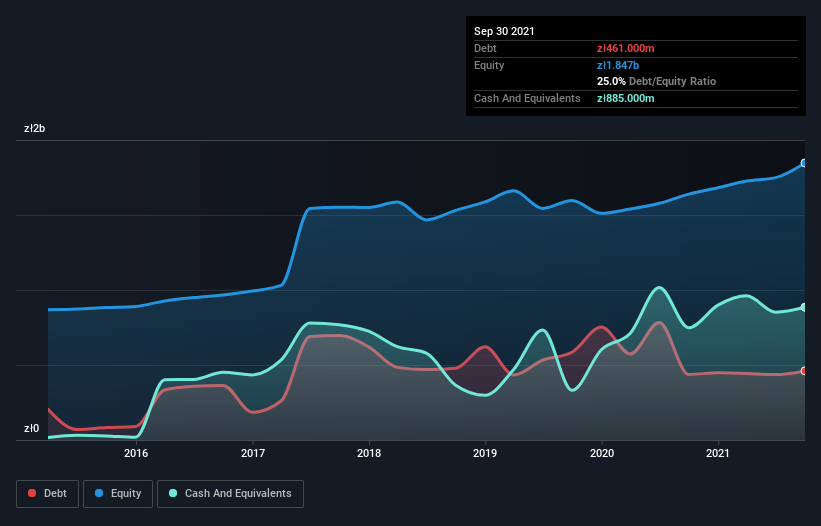
David Iben put it well when he said, 'Volatility is not a risk we care about. What we care about is avoiding the permanent loss of capital.' When we think about how risky a company is, we always like to look at its use of debt, since debt overload can lead to ruin. We note that Famur S.A. (WSE:FMF) does have debt on its balance sheet. But the more important question is: how much risk is that debt creating?
When Is Debt Dangerous?
Debt is a tool to help businesses grow, but if a business is incapable of paying off its lenders, then it exists at their mercy. In the worst case scenario, a company can go bankrupt if it cannot pay its creditors. However, a more common (but still painful) scenario is that it has to raise new equity capital at a low price, thus permanently diluting shareholders. Of course, plenty of companies use debt to fund growth, without any negative consequences. The first thing to do when considering how much debt a business uses is to look at its cash and debt together.
See our latest analysis for Famur
What Is Famur's Net Debt?
The image below, which you can click on for greater detail, shows that at September 2021 Famur had debt of zł461.0m, up from zł437.0m in one year. But on the other hand it also has zł885.0m in cash, leading to a zł424.0m net cash position.

A Look At Famur's Liabilities
According to the last reported balance sheet, Famur had liabilities of zł521.0m due within 12 months, and liabilities of zł289.0m due beyond 12 months. Offsetting this, it had zł885.0m in cash and zł545.0m in receivables that were due within 12 months. So it actually has zł620.0m more liquid assets than total liabilities.
This luscious liquidity implies that Famur's balance sheet is sturdy like a giant sequoia tree. With this in mind one could posit that its balance sheet means the company is able to handle some adversity. Succinctly put, Famur boasts net cash, so it's fair to say it does not have a heavy debt load!
In fact Famur's saving grace is its low debt levels, because its EBIT has tanked 22% in the last twelve months. When it comes to paying off debt, falling earnings are no more useful than sugary sodas are for your health. There's no doubt that we learn most about debt from the balance sheet. But ultimately the future profitability of the business will decide if Famur can strengthen its balance sheet over time. So if you're focused on the future you can check out this free report showing analyst profit forecasts.
Finally, a business needs free cash flow to pay off debt; accounting profits just don't cut it. While Famur has net cash on its balance sheet, it's still worth taking a look at its ability to convert earnings before interest and tax (EBIT) to free cash flow, to help us understand how quickly it is building (or eroding) that cash balance. During the last three years, Famur generated free cash flow amounting to a very robust 98% of its EBIT, more than we'd expect. That puts it in a very strong position to pay down debt.
Summing up
While it is always sensible to investigate a company's debt, in this case Famur has zł424.0m in net cash and a decent-looking balance sheet. The cherry on top was that in converted 98% of that EBIT to free cash flow, bringing in zł124m. So is Famur's debt a risk? It doesn't seem so to us. Over time, share prices tend to follow earnings per share, so if you're interested in Famur, you may well want to click here to check an interactive graph of its earnings per share history.
At the end of the day, it's often better to focus on companies that are free from net debt. You can access our special list of such companies (all with a track record of profit growth). It's free.
New: Manage All Your Stock Portfolios in One Place
We've created the ultimate portfolio companion for stock investors, and it's free.
• Connect an unlimited number of Portfolios and see your total in one currency
• Be alerted to new Warning Signs or Risks via email or mobile
• Track the Fair Value of your stocks
Have feedback on this article? Concerned about the content? Get in touch with us directly. Alternatively, email editorial-team (at) simplywallst.com.
This article by Simply Wall St is general in nature. We provide commentary based on historical data and analyst forecasts only using an unbiased methodology and our articles are not intended to be financial advice. It does not constitute a recommendation to buy or sell any stock, and does not take account of your objectives, or your financial situation. We aim to bring you long-term focused analysis driven by fundamental data. Note that our analysis may not factor in the latest price-sensitive company announcements or qualitative material. Simply Wall St has no position in any stocks mentioned.
About WSE:GEA
Grenevia
Manufactures and sells machinery and equipment for mining, transport, handling, and power industries worldwide.
Undervalued with excellent balance sheet.
Similar Companies
Market Insights
Community Narratives




